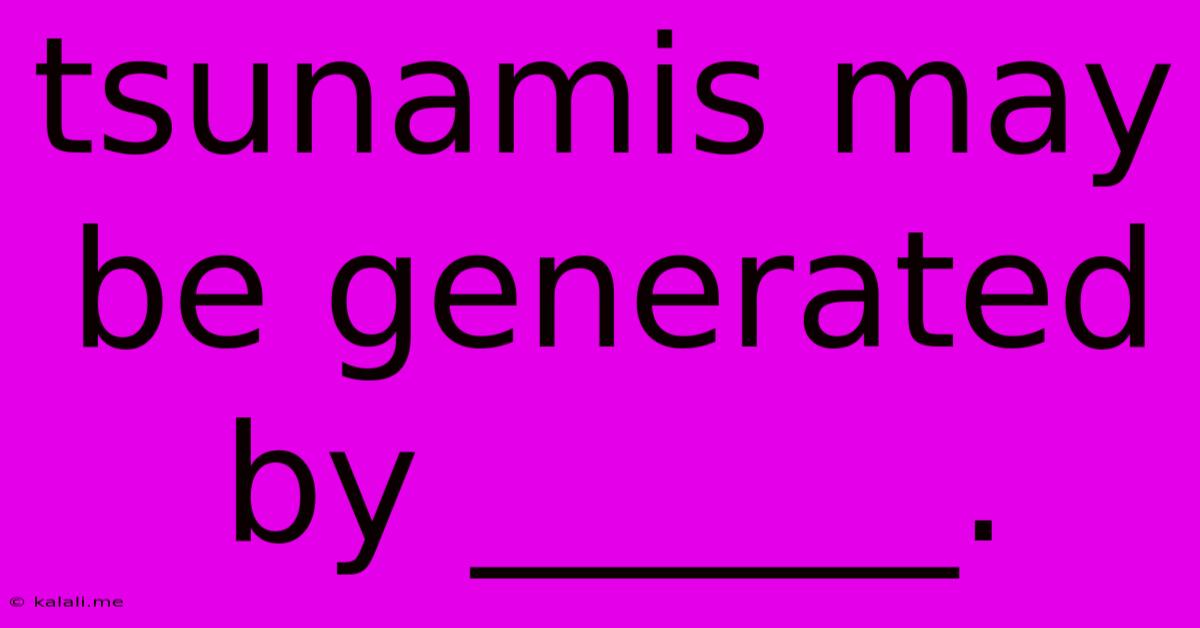Tsunamis May Be Generated By ______.
Kalali
Jun 13, 2025 · 3 min read

Table of Contents
Tsunamis May Be Generated By: A Comprehensive Overview of Causative Factors
Tsunamis, those devastatingly powerful ocean waves, are not simply caused by a single event. Understanding the various mechanisms that trigger these catastrophic events is crucial for preparedness and mitigation efforts. This article explores the diverse range of phenomena that can generate tsunamis, from the most common to the less frequent yet equally impactful causes.
Understanding Tsunamis: A Quick Overview
Before delving into the causes, it's important to understand what a tsunami is. Unlike typical ocean waves generated by wind, tsunamis are caused by the sudden displacement of a large volume of water. This displacement generates a series of waves that can travel across vast ocean distances at incredible speeds, only to build into towering walls of water upon reaching shallower coastal regions. The immense destructive power of a tsunami stems from its sheer volume and velocity.
Primary Causes of Tsunamis:
Several natural phenomena can trigger tsunamis, with earthquakes being the most prevalent.
1. Earthquakes: The Most Common Culprit
Submarine earthquakes, particularly those of magnitude 7.0 or greater and occurring at shallow depths, are the leading cause of tsunamis. These seismic events along tectonic plate boundaries create a sudden vertical displacement of the seafloor, instantly displacing the water column above and initiating a tsunami wave. The size and intensity of the earthquake directly influence the magnitude and impact of the resulting tsunami. The epicenter location and the fault mechanism also play significant roles in determining the tsunami’s characteristics. Areas located along the Ring of Fire, a zone of intense seismic activity circling the Pacific Ocean, are particularly vulnerable to earthquake-induced tsunamis. Think of the devastating 2004 Indian Ocean tsunami and the 2011 Tohoku tsunami in Japan as prime examples.
2. Volcanic Eruptions: Submerged and Terrestrial
Volcanic eruptions, both underwater and on land near the coast, can also generate tsunamis. Submarine volcanic eruptions can trigger tsunamis through the rapid displacement of water caused by the explosion of magma and the collapse of volcanic structures. Similarly, massive flank collapses of terrestrial volcanoes near the coast can cause significant displacement of water, generating destructive waves. The eruption of Krakatoa in 1883 is a historical example of a volcanic eruption causing a large and devastating tsunami. The pyroclastic flows and subsequent caldera collapse generated a series of waves that caused immense damage and loss of life. The scale of volcanic tsunami generation depends on the magnitude of the eruption and the proximity to coastal regions.
3. Landslides: Underwater and Coastal
Underwater and coastal landslides can trigger powerful tsunamis. Large underwater landslides, often caused by earthquakes or volcanic activity, can displace vast volumes of sediment and water, generating waves that propagate across the ocean. Similarly, massive landslides occurring on land and entering the ocean can displace a large volume of water, also initiating tsunami waves. These events are often localized, but their impact can be severe in nearby coastal areas. The volume and velocity of the landslide are crucial factors determining the tsunami's size.
4. Meteorite Impacts: A Less Frequent but Powerful Threat
While extremely rare, the impact of a large meteorite into the ocean can generate a colossal tsunami. The impact's force would displace an enormous volume of water, initiating a wave of unimaginable scale. The extent of such a tsunami would depend on the size and velocity of the impacting meteorite. While a statistically unlikely occurrence, the potential devastation makes it a factor worthy of consideration in long-term risk assessment.
Conclusion:
Tsunamis are a formidable force of nature with the potential to cause widespread destruction. Understanding their diverse causes, from the commonplace earthquake-triggered events to the rarer occurrences like meteorite impacts, is essential for developing effective early warning systems, implementing robust mitigation strategies, and building resilient coastal communities. Further research and monitoring efforts are crucial for improving our understanding of these devastating natural hazards and mitigating their impact.
Latest Posts
Latest Posts
-
A Body Of Land With Water On Three Sides
Jun 14, 2025
-
How To Submit Sat Scores To Colleges
Jun 14, 2025
-
A Group Of Cells Is Called A
Jun 14, 2025
-
What Is Difference Between Tort And Crime
Jun 14, 2025
-
How To Calculate The Average Force
Jun 14, 2025
Related Post
Thank you for visiting our website which covers about Tsunamis May Be Generated By ______. . We hope the information provided has been useful to you. Feel free to contact us if you have any questions or need further assistance. See you next time and don't miss to bookmark.